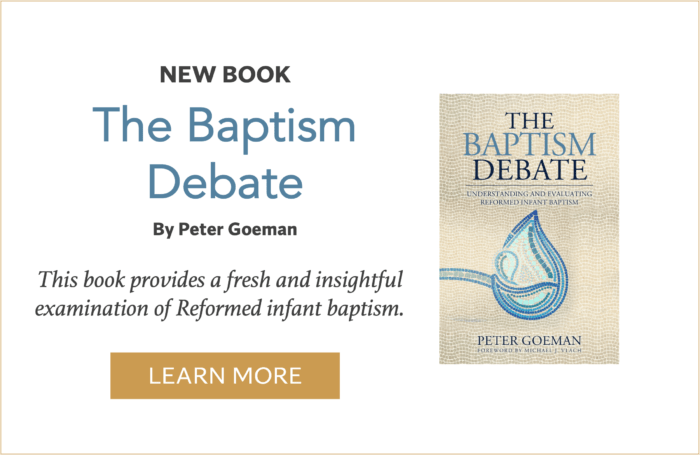The Baptism Debate: Understanding and Evaluating Reformed Infant Baptism
The majority of those who identify as Christians believe in infant baptism (also known as paedobaptism). Infant baptism is a major doctrinal belief for Catholics, Lutherans, Anglicans, and Reformed churches, such as Presbyterians. Yet, there is a strong contingent of Christians who reject infant baptism, arguing that only those who believe in Christ should be baptized (a position known as credobaptism). Given the fact that baptism is a core command within the church, this is an essential issue on which to have an opinion!
This debate about baptism can sometimes get messy and confusing. Christians on both sides of the issue often do not understand their own position, let alone the opposing arguments. I wrote The Baptism Debate to help believers understand what baptism is and why infant baptism does not actually fulfill the biblical definition of baptism. Because Catholics and Lutherans have their own reasons for baptizing infants, I decided to focus the book on understanding why Reformed denominations (like Presbyterians) baptize infants. Although the book is helpful for understanding paedobaptism as a whole, the main purpose is to discuss the topic within the conservative circles of Reformed theologians.
The Outline of The Baptism Debate
The outline of the book is as follows:
- Chapter 1: The Relationship between Faith and Baptism.
- Chapter 2: Understanding the Reformed Paedobaptist Position
- Chapter 3: Paedobaptism and the Covenant of Grace
- Chapter 4: Paedobaptism and the One People of God
- Chapter 5: Has Baptism Replaced Circumcision?
- Chapter 6: Household Baptisms and the Covenantal View of Families
- Chapter 7: The Biblical Significance and Mode of Baptism
- Chapter 8: Embracing the Biblical Picture of Baptism
In the first chapter, I set up the defining question concerning infant baptism—what is the relationship between faith and baptism? I show that a biblical analysis demands a strong connection between faith and baptism. The connection between faith and baptism gives some significant problems to those who adhere to infant baptism.
In the second chapter, I summarize the Reformed framework of covenant theology. I avoid any critiques in this chapter and only seek to fairly present the Reformed position on infant baptism. [You can get a sample of the second chapter here].
In the third chapter, I launch a thorough analysis of the focal point of covenant theology—the covenant of grace. Because the Reformed paedobaptist position completely depends on the belief in a covenant of grace, I discuss the arguments for (and against) the covenant of grace.
In the fourth chapter, I present the argument for one people of God, which Reformed paedobaptists say is the same in both Old and New Testaments. The identity of one unchanging people of God is a crucial component of the argument for infant baptism.
In the fifth chapter, I address the fundamental argument that baptism has replaced circumcision, and the two signs are essentially equal in signifying acceptance into the covenant community. We do a deep dive into circumcision and comparing whether it matches with baptism.
In the sixth chapter, I deal with household baptisms and corporate headship. The Reformed paedobaptist argues that when the head of the household embraces Christ, the rest of the family would also be baptized in solidarity with the head of the household.
In the seventh chapter, I deal with the mode and significance of baptism. While chapters two through six deal with understanding and evaluating the Reformed paedobaptist argumentation, this seventh chapter provides a positive presentation about the meaning of baptism. We conclude the chapter by asking whether infant baptism can fulfill the meaning of baptism defined by Scripture.
Chapter eight is a concluding chapter where I provide a brief challenge to the reader to follow the text of Scripture on the subject of baptism.
Why did I write this book?
In short terms, I wrote the book because I didn’t know anything about infant baptism. I knew infant baptism was nowhere mentioned in Scripture, but I respected Reformed theologians enough not to assume they were idiots! So, I went on a long prolonged study to see why Reformed theologians thought infant baptism was defendable.
Who is this book written for?
I wrote this book for those who are interested in baptism. I specifically targeted those who are working through the issue of whether or not infant baptism is biblical. As a bonus, I really do think the book helps believers understand how, historically, covenant theology and infant baptism go hand in hand.
How is my book different than other books on baptism?
Although it is hard to concisely answer that question, I think the biggest differences are: (1) Attention spent to the historical aspect of faith & baptism being interrelated (I haven’t seen that before); (2) spending significant time interacting with the covenant of grace arguments for infant baptism; and (3) compiling what I think are the best answers historically into one volume.
There are a couple more videos from this interview that are available here.
How can YOU win a free book and download a free chapter?
The Baptism Debate will be releasing April 3! As a preparation for the release, I have two copies of the book to giveaway. The drawing will be held March 31, 2023. Additionally, if you want to get a feel for the book, here is a 55 page sample for your perusal (all the intro material, bibliography, and the second chapter).
Update: The giveaway has concluded, and the participants have been contacted. However, you can still buy The Baptism Debate!
I’m really excited about this book and I’ve gotten a lot of encouraging feedback from people who are being faced with this issue and who want to learn more about it. I pray the Lord uses it to spur obedience and faith from His people. To Him be the glory.
